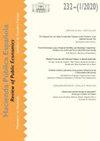Pardon does not forgive democracy: econometrical analysis of pardons in Spain
IF 0.7
4区 经济学
Q3 ECONOMICS
Hacienda Publica Espanola-Review of Public Economics
Pub Date : 2016-03-01
DOI:10.7866/HPE-RPE.16.1.4
引用次数: 1
Abstract
The pardon is a legal, although controversial, instrument with a long history that persists in many different judicial systems across the world. The juridical literature often considers it to be a perversion in the separation of powers within the State, and the motivations behind it are always under scrutiny. In this paper we seek to establish whether there are specific factors that affect and determine pardons. Using a database of all pardons granted in Spain between 1995 and 2013, including our own elaborated individual data, the econometrical estimations produce the following conclusions: firstly, Spain’s right-wing political party processes pardons faster than that of the left; secondly, and due to public concern, pardons are less frequent near elections; and thirdly, the higher the fine, the faster the pardon. These results show that the pardon is used in a discretionary way and in most cases greatly distorts the separation of powers that should provide the basis of any healthy democratic system.赦免不宽恕民主:西班牙赦免的计量经济学分析
赦免是一种法律手段,尽管存在争议,但历史悠久,在世界上许多不同的司法体系中一直存在。司法文献常常认为这是对国家内部权力分立的歪曲,其背后的动机总是受到审查。在本文中,我们试图确定是否存在影响和决定赦免的具体因素。利用1995年至2013年间西班牙所有赦免的数据库,包括我们自己详细阐述的个人数据,计量经济学估计得出以下结论:首先,西班牙右翼政党处理赦免的速度快于左翼政党;其次,由于公众的关注,赦免在临近选举时不那么频繁;第三,罚款越高,赦免越快。这些结果表明,赦免的使用是自由裁量的,在大多数情况下,极大地扭曲了权力分立,而权力分立本应是任何健康民主制度的基础。
本文章由计算机程序翻译,如有差异,请以英文原文为准。
求助全文
约1分钟内获得全文
求助全文
来源期刊

Hacienda Publica Espanola-Review of Public Economics
Economics, Econometrics and Finance-Finance
CiteScore
0.90
自引率
14.30%
发文量
14
期刊介绍:
Hacienda Pública Española/Review of Public Economics welcomes submissions on all areas of public economics. We seek to publish original and innovative research, applied and theoretical, related to the economic analysis of Government intervention. For example, but not exclusively: Taxation, Redistribution, Health, Education, Pensions, Governance, Fiscal Policy and Fiscal Federalism.
In addition to regular submissions, the journal welcomes submissions of:
-Survey Reviews, containing surveys of the literature regarding issues of interest in the Public Economics field;
-Policy oriented reviews, showing the current contributions of Public Economics in relation to relevant contemporary issues affecting public decision-makers in the real world (Policy Watch);
-Comments of previously published articles. Contributions to this section should be limited to a maximum of 2 000 words (12 pages). If deemed adequate, the authors of the commented article will be given the opportunity to react in a Reply. Both Comment and Reply will be published together.
Articles for the Survey Reviews and Policy Watch section are subject to the same double blind reviwing procedure. The adequacy of Comments submitted for publication will be evaluated by the Executive Editors.
 求助内容:
求助内容: 应助结果提醒方式:
应助结果提醒方式:


